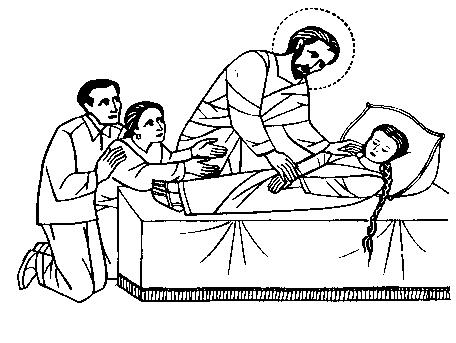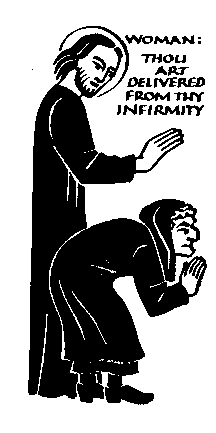 6: Faith and Prayer
6: Faith and Prayer
![]() Read
Mark 5:21-24 and 35-43.
Read
Mark 5:21-24 and 35-43. 
 Task Mk 1
Task Mk 1
What did Jesus say when the messenger said that the girl was dead?
 Task Mk 2
Task Mk 2
What did he tell the people at the house and how did they respond?
 Task Mk 3
Task Mk 3
What Aramaic words did Jesus use. What do they mean?
This miracle is often said to be a raising from the dead, but Jesus himself said that the girl was only sleeping. This might mean that she was in a coma, or that she was only clinically dead. Clinical death is a condition in which all signs of life have ceased but from which recovery is possible. Whatever the case, she was not dead in the final sense of the word.
The emphasis here is on faith. But many people misunderstand faith and think it is blind, unthinking acceptance of what you are told. The idea of blind faith was a nineteenth century invention and has been a burden on Christianity. Faith is not just believing in a set of teachings, although this is part of it. It is a belief in a person whose presence enters your life, the person of Jesus Christ. Faith involves accepting Christ and placing your trust in him. In this story when we see how Jesus simply told the bereaved parents to have faith we see that he was saying "Trust me. I can do something about this." The gospel is saying that trusting in Jesus is the way to bring his power to bear in your life.
The gospel shows us how Jesus speaks and the girl awakes. We are shown how his word penetrates deep into the girl’s mind. It is a life-giving word which awakens her from her deathlike condition. Christians can interpret the gospel message as saying that when we are open to Christ his influence penetrates deep into the depths of our selves and gives spiritual life.
 Task Mk 4
Task Mk 4
What does the story of Jairus’ daughter teach us about faith?
 Task Mk 5
Task Mk 5
There is at present a healing ministry in the Christian community. Many people pray for healings at shrines or through special healing services. The principle behind them is that mind and body are not two separate systems, but are a single whole, so to heal the body fully you must heal the mind. Some bodily diseases arise in through problems of a personal or mental nature. Do you think this is a good idea in an age when medicine is so advanced? Have you or anyone you know ever been to such a service or encountered them?
![]() Read
Mark 5:25-34.
Read
Mark 5:25-34.
 In this story we read of
a woman who was considered unclean and, therefore, unfit to take part in public worship.
She was unclean because of a flow of blood, for anyone with such a blood flow was
considered unclean, and anyone who touched her became unclean as well for a short period.
We do not know the cause of this haemorrhage, but sometimes after childbirth such bleeding
occurs. Nowadays it is easily curable, but then it was not. She decided to touch
Jesus’ cloak, possibly because she felt too embarrassed to ask for help, or because
she felt that her uncleanness would have made a great rabbi despise her. Being unclean for
so long would have had a damaging effect on her self-esteem, and she would have felt
worthless. Such illnesses were often thought of as punishment from God, and this would not
have helped her self-esteem at all.
In this story we read of
a woman who was considered unclean and, therefore, unfit to take part in public worship.
She was unclean because of a flow of blood, for anyone with such a blood flow was
considered unclean, and anyone who touched her became unclean as well for a short period.
We do not know the cause of this haemorrhage, but sometimes after childbirth such bleeding
occurs. Nowadays it is easily curable, but then it was not. She decided to touch
Jesus’ cloak, possibly because she felt too embarrassed to ask for help, or because
she felt that her uncleanness would have made a great rabbi despise her. Being unclean for
so long would have had a damaging effect on her self-esteem, and she would have felt
worthless. Such illnesses were often thought of as punishment from God, and this would not
have helped her self-esteem at all.
What is of interest here is that Jesus did not know who touched him, but knew that power had gone out of him. His demand that the woman come forward was probably so that he could advise her of the true cause of her cure, which was her faith. Jesus’ cure not only helped her whole self. Her body was cured, she was no longer untouchable and she could regain her self-respect.
 Task Mk 6
Task Mk 6
Why do you think the woman was afraid of Jesus?
 Task Mk 7
Task Mk 7
How far is it true to say that Jesus cured not only her body but her whole life?
 Task Mk 8
Task Mk 8
![]() Read
Mark 1, 40-45
Read
Mark 1, 40-45
What does this miracle have in common with the story of the woman with the haemorrhage? How do they differ?
Faith is here shown to be life-changing. Just meeting Christ and seeking his help is life-enhancing. The woman would have walked away from that meeting into a much better life. It is the Christian belief that such faith is possible today. The resurrection faith is that Christ is alive and active in the world. Christians believe that to allow him into your life is to open your self to a great power for goodness. This does not cure all physical ills, but Christians believe that Christ does have a beneficial influence on your personality. Christ helps you to grow as a person. This means that you become more loving, more forgiving, have greater moral strength and so on.
This leads us to the topic of prayer. There are a few references in Mark’s Gospel to Jesus’ praying. In 6, 45-46 we read of Jesus dismissing the disciples while he prayed alone, and we read of his rising early to pray in 1, 35. He prayed for many days in the desert before beginning his ministry. We find that Jesus prayed in Gethsemane before his arrest. Prayer, for Jesus, was an integral part of his life, as we can see from the fact that he turned to it at critical moments.
This raises the question of the role of prayer in the Christian life. Christians regard Christ as their role model. This means that they too attempt to live a life of prayer. A Christians use prayer to strengthen them in their struggle against the evil which lies in themselves and in the world. They turn to God for guidance in making the right decisions in life. They ask for help in taking the path in life which God wants of them. They turn to God for comfort in times of trouble. They ask God to forgive their sins. Yet they also simply wish to express their love for God and their gratitude to him for all he has done for them. It is essential to realise that for Christians prayer is one way in which they keep the first great commandment to love God with all their heart, soul, mind and strength. If you love people you talk to them and spend time with them, and we do this with God in prayer.
 Task Mk 9
Task Mk 9
What part in your life does prayer play? Do you think that it ought to play a greater part?
 Task Mk 10
Task Mk 10
Identify some instances when Jesus prayed.
 Task Mk 11
Task Mk 11
What sort of things do Christians pray about?
 Task Mk 12
Task Mk 12
![]() Read
Mark 9:14-29.
Read
Mark 9:14-29.
Write in list form the main elements in the story
In the time of Jesus this condition would have been interpreted as the result of possession by an evil spirit. Nowadays we know it as epilepsy, a disease caused by physical damage to the brain. For some reason the apostles were unable to cure the boy, possibly because the frightening symptoms unnerved them and caused their faith to waver. Jesus. however, did cure the boy, although there was a frightening display of epilepsy as he did so. What is interesting about this passage is Jesus’ statement that this kind can only be cast out by fasting and prayer, (although there is evidence that the word fasting was added to the manuscript of Mark at a later date). No one has fully explained Jesus’ words on this issue, but the thrust of his message is that prayer is the method for dealing with many kinds of problems. Prayer brings your mind into contact with the supreme good, and so evils which have their source in the mind are the kinds which may be cured by prayer. Even so, we ought not think that cure is instantaneous. It may well be that many problems which are rooted in the mind require sustained prayer, along with other kinds of treatment if they are to recover.
The boy’s father claimed that he believed, but asked Jesus to help his unbelief. The word for unbelief is oligopistia, meaning little-faith or weak faith. The father was asking Jesus to enhance his faith.
 Task Mk 13
Task Mk 13
How does Jesus get the father to declare his faith?
 Task Mk 14
Task Mk 14
![]() Read
Mark 8, 24-30
Read
Mark 8, 24-30
How does Jesus get the Syrophoenician woman to declare her faith?
 Task Mk 15
Task Mk 15
- Read the following statements
- (a) "Prayer does no good at all. You are just talking to yourself. It does nothing for me."
- (b) "I have found that prayer has helped me to calm my worries, see my way through problems and become a better person."
- What is your opinion on this issue?